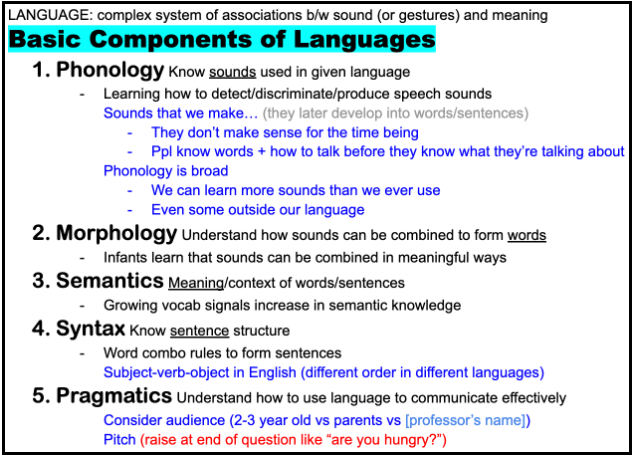Note-Taking Isn’t Enough
Study strategies with enhanced effectiveness in knowledge retention
Source: Unsplash (@firmbee)
When it comes to classes, there can be a lot to know and understand. Sometimes, we end up forgetting the material after our course ends, or worse, during an exam. That’s if, the information was ever retained in the first place. In this article, we’ve compiled some effective strategies to enhance your knowledge retention!
1. Practice Active Learning
Read. Take notes. Cool. But how about organizing your notes? Obvious methods include underlining, or better, highlighting. You could also try grouping similar topics together by chunking or having multiple levels of bullet points (see image below for example). Colours are also a good way to go, and can visually highlight different themes, levels, or sources of information.
In the notetaking example above, I list headings for 5 components of languages. A basic definition follows, with explanations listed below and examples in a different colour.
Yet, despite all these methods, experts say it’s not enough. Only reading and writing notes are referred to as passive study strategies. To enhance your studying, you need to pursue active study strategies.
Going back to your notes later, you could edit and re-organize them. For one thing, repetition is key. As much as possible, return to older notes/topics and make connections to newer material – or what you learned from elsewhere (especially other classes). That’ll help you further engage with the material. That way, things you previously learned and noted can be revisited, and revised.
Furthermore, don’t just read, write, and rewrite. Explain the materials out loud and in your own words, and quiz yourself. Even better if you do it with a peer! But if you’re studying alone, you could explain your notes aloud as if you were teaching a class. That way, you can practice different modes of delivery — both written and verbal. When you quiz yourself, go over one part at a time. As time goes on, you’ll find yourself depending less and less on your notes. With repetition, engagement, and different modes of delivery (written and oral), you are actively interacting with course material rather than passively reading it.
2. Work with Peers
Studying can be even more effective if you do it with a peer. As you study with friends, you can quiz each other, identifying areas of strength and weakness:
Perhaps your strength is in unit A and your friend is better at unit B. You can help each other there.
Or, you two can breeze through unit A, but have trouble with B. Having a friend acts as a source of motivation for both parties to gain an understanding and to problem-solve.
Or, you’re the smart kid and your friend is struggling in the class. If you two study together, research shows that both of you will benefit – but more so you. This is because you get to do the teaching and talking, articulating explanations of concepts and information in order for them to understand, increasing your engagement with the subject matter the most.
It’s important that you surround yourself with peers who are motivated to study and want to do well. Discussions are a great source of engagement, and will make it easier to retain knowledge and understanding. Later on, you can quiz each other, and discuss without the help of your notes or textbooks, and mark down things you have trouble with along the way.
Most importantly, I cannot forget to emphasize the importance of health (both mental and physical). Stay hydrated, nourished, well rested, and calm, yet motivated, focused, and accountable — this will be key to improving your knowledge retention!


